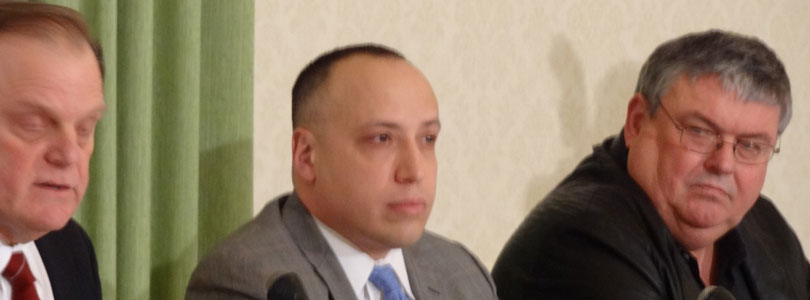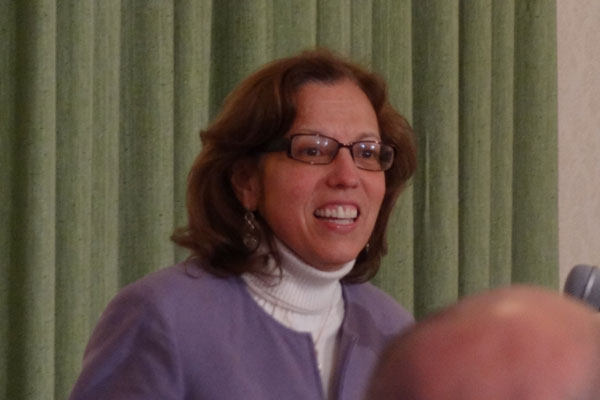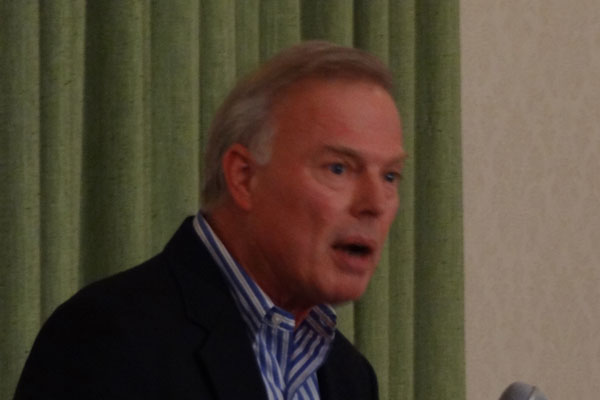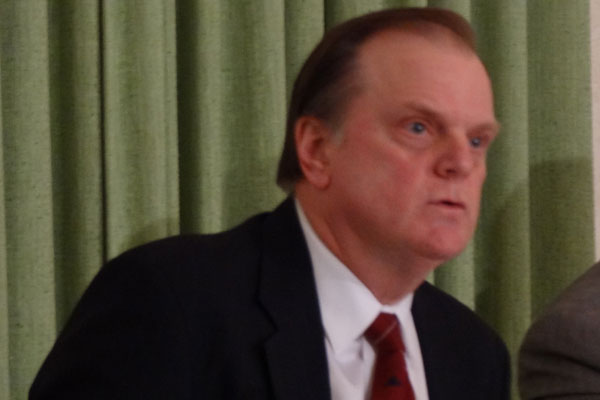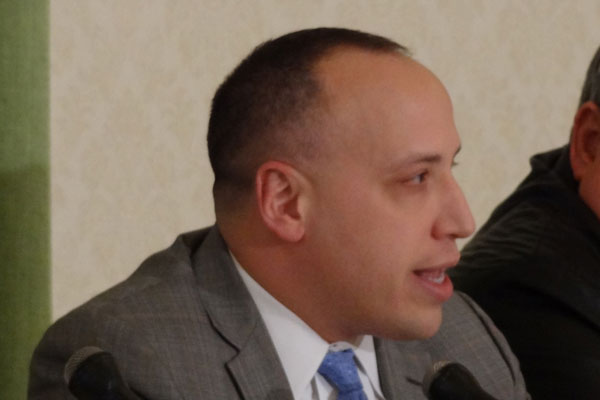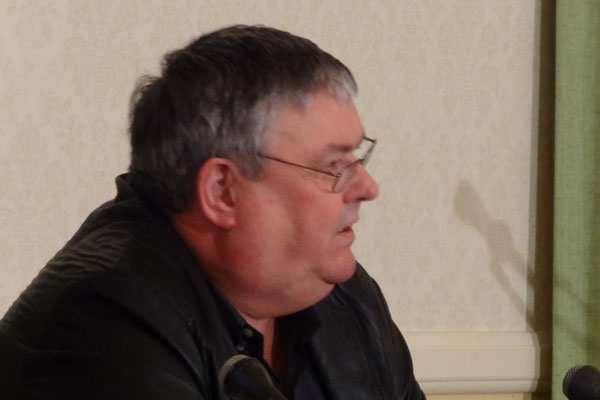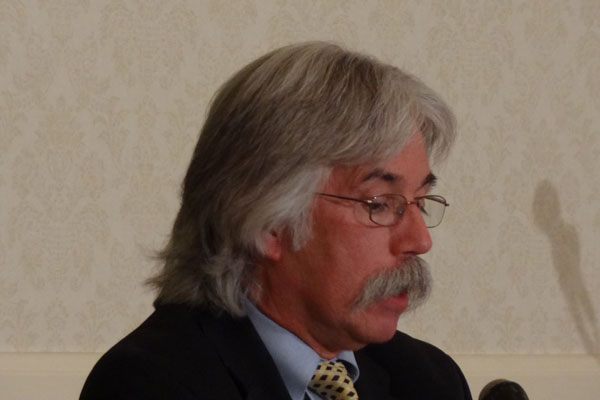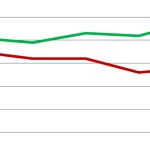RI Senate Economic Summit, Quonset “O”
5:09 p.m.
The R.I. Senate’s Economic Summit at the Quonset “O” Club is running a little late, leaving those of us at the media table to chat about follies, both the performance kind and the municipal government kind. Meanwhile, I’m crossing my fingers hoping that the liveblogging chops I once had haven’t atrophied from disuse.
If I can do it from a circa 2002 cell phone with a folding keyboard, I suppose it shouldn’t be so hard now that I’ve got all the technological bells and whistles.
5:13 p.m.
By way of conveying the anecdotal experience, upon arrival 15 minutes early, I was surprised at the lack of cars in the parking lot. Among the few Senators who beat me into the building, the Republicans were disproportionately represented. Perhaps they carpooled so as to cut down on travel costs; their budget can’t be but so extensive.
5:20 p.m.
We’re underway, with opening remarks from Senate President Teresa Paiva Weed. The good news is that dinner will be served earlier than expected.
Paiva Weed included the resisting of tax increases among her list of past accomplishments.
5:22 p.m.
The tables are all full, mostly of people whom I don’t know (yet). To be honest, I expected more media coverage; the event is actually not being held in the large ballroom, but in a side dining hall.
Paiva Weed: “During difficult economic times we look to our business community to sustain” economic health. … “I believe that our ports are a key to our economic success.”
5:24 p.m.
Senator William Walaska is up: Ports offer good-paying blue-collar jobs, averaging about $40,000 per year.
5:25 p.m.
He’s going to go through six recommendations from the legislative commission on port development of which he’s co-chair. “A single entity should be charged with interagency activities around port development.”
He says ports are less mentioned than our knowledge center and the airport, but it’s got more jobs and more economic potential. (No mention, yet, of a globally targeted massive casino operation, but the night is early.)
5:28 p.m.
Wants to develop an RIPMC — Rhode Island Port Marketing Collaborative “A sort of chamber of commerce for the ports.”
His commission encourages the General Assembly to ask the feds (DOT) to be an “official participating designation port” among recognized highway initiatives. (Sorry, lots of large technical terms flying by; we’ll have to go to the tape later.)
RI federal delegation needs to become further involved.
5:30 p.m.
“Looking for public-private partnership.” Recommends no federal funding for major dredging to avoid a tax, but wants to float a harbor maintenance bond. I might have missed something, but I have to wonder how that revenue doesn’t count, ultimately, as a tax.
5:33 p.m.
Wants CRMC to do a dredging study. Wants the relevant statewide planning group to increase access to type 6 water usage, that is “heavy commercial.” “The prior administration” in Providence was seeking activities on Allens avenue that would have harmed this initiative.
5:35 p.m.
“Businesses need certainty.” Even talking about zoning changes might scare away possible investors/businesses.
5:37 p.m.
In sum, the committee is recommending:
- Port authority quality ombudsman (I might be off a little on the term)
- The market collaborative
- Federal involvement
- A bond
5:40 p.m.
First panel speaker is John Holmander, VP-VIRGINIA Class Program Manager, Electric Boat.
5:43 p.m.
The RI infrastructure “provides a unique opportunity for us — Rt. 95, airport, rail, harbor.
5:45 p.m.
His slide 4 shows the comparison of MA, CT, & RI. He says if RI’s average wage were a little higher, it would go a long way to resolving some of the state’s revenue problems:
MA: $53.7K; CT: $51.9K; RI: $45.9K.
5:47 p.m.
His next slide again lists the state’s infrastructure as a “strength.” One wonders, then, why maintenance expenses aren’t the very first budget item funded every year, rather than the apparent last, relying on bonded debt.
5:49 p.m.
First goal should be increasing education, especially math, reading, and ability to work in a team environment. He’s not talking about sending everybody to college for those much lauded high-tech jobs, but skilled tradesmen like welders.
“Had children’s choices been explained to them growing up, they would have made better decisions.” Especially, behavior. “Not everybody is college bound.”
5:52 p.m.
Describing Electric Boat’s school outreach programs: “You can bring the assets, but it’s people that make it happen.”
“We do a tremendous amount of on-the-job training.”
5:55 p.m.
Now he’s describing the number of charitable and community activities by which RI benefits from Electric Boat’s presence. His request, of legislators, consists mainly of tax incentives, a state-driven training program, loans for job creation, and money for housing and transportation.
5:57 p.m.
Next up is Jeff Grybowski, chief administrative officer, Deepwater Wind. “But for the leadership of many of the people in this room, Deepwater wouldn’t be in the state.”
5:59 p.m.
He’s saying that RI was smart to get ahead of the “energy future.” He dangles the opportunity of a large market in China. A couple of observations about his slides. The first is a cute young girl holding a pinwheel into the air. Slide 2 is an absurdly dense bunch of paragraphs about the company.
Deepwater has only 10 employees in RI.
6:02 p.m.
The next slide lists “Deepwater’s substantial investments in RI.” I infer that the money will ultimately derive, directly or indirectly, at least in part from the inflated energy prices that Governor Carcieri and the General Assembly determined the company should be able to charge.
6:05 p.m.
The wind off the New England coast makes the region “the Saudi Arabia of offshore wind.” His slide looks like most of it is actually east of RI waters.
He notes that China and Germany are outpacing the United States in investments in “clean energy,” mixing wind, solar, and geothermal. Those countries dominate a list of the “top 10 wind turbine manufacturers in the world”… which makes sense, because they’re investing in them (implying government investment.
6:10 p.m.
A windfarm is “a $5 billion investment”… which explains why it will create 1,045 jobs in New England, for a total in “man years” of 5,035. A quick calculation shows me that it works out to approximately $993,000 per “man year” worked.
6:17 p.m.
“The idea that wind energy is receiving subsidies that are unjustified” is wrong. Because
- From 1918-2009 oil and gas received a little under $5 billion in 2010 dollars
- From 1947-1999 nuclear received about $3.5 billion
- From 1980-2009 biofuels have received about $1 billion
Windfarm companies just want their cut of the action.
6:21 p.m.
The last speaker on the panel is Geir Monsen, VP of Sea Freeze. He notes that every other country with long coastlines relies heavily on its access to water. The United States was founded around “safe, good harbors” with “a huge merchant marine engaged in international trade, growing in leaps and bounds.”
6:25 p.m.
“In the United States, we’re stuck with the union rules and the union manning.” It’s not the union wages, those are relatively low. “When you have manning rules to change a light bulb that takes five minutes,” but you have to hire a man and a supervisor for three days, “you can’t compete internationally; it’s as simple as that.”
The next problem is are unnecessary “feel good” rules from the PATRIOT Act.
“To think of Davisville or the Port of Providence as a target for terrorists is wishful thinking at best.”
6:28 p.m.
Shipping to Alaska, he’s had to unload in other states, but has faced the obstacle of having Homeland Security insist that his relatively inexpensive foreign workers were too risky, so he had to pay $40,000 more for local labor. So, next year, he’s diverting one ship to South Korea and another to Canada.
6:31 p.m.
He notes, though, that the majority of the jobs in his company are high pay “because we’re able to able to make a good profit.” “If we had to follow union rules” for all employees “we wouldn’t be in business. There’s no question.”
6:34 p.m.
“I spend most of my working day fighting the federal government. That’s a sad state of affairs.” An example is a disagreement over the number of butterfish offshore; his company’s research says there are plenty, while the government is saying there are none.
6:37 p.m.
Question 1, Sen. Algieres: Has Electric Boat looked into diversification specifically with hull fabrication?
Holmander: Electric boat would focus on motors. They work with high-yield steels. In other words, the work appears similar, “it’s really not the same type of work.” “We have the infrastructure to build and certify nuclear submarines.” That skill set is more in line with energy generation (e.g., Deepwater) than regular construction.
One submarine is equivalent (in man hours) to an entire windfarm field, so they don’t want to lose their focus.
6:41 p.m.
Sen. Snowski notes that they’ve been working with Sen. Reed to get Rhode Island representation in decision making with regard to butterfish.
She asked about the timeline for Sea Freeze’s increased capacity in Point Judity. It’ll be soon.
6:43 p.m.
Sen. DiPalma asked about training. Holmander notes that Electric Boat is constantly working on training, but the industry is increasingly complex. One example is fiber optics. “It costs $20,000 to teach somebody how to splice fiber optics.” Just the materials alone involved in training are amazing.
Contrary to apparent trends, their jobs are becoming less specialized, more generalized, because of efficiencies in production.
6:46 p.m.
Walaska asked if the federal designation that he mentioned before would assist Sea Freeze. Monsen said, “yes.”
6:52 p.m.
We’re into the dinner break. (For really sharp-eyed budget hawks, I note that I’m only going to have a soda and some bread.)
7:07 p.m.
Sen. President Communications Director Greg Paré is eating at the press table, and he tells me that the Senate President pays for this event out of campaign funds. I therefore modify the above parenthetical quip as follows: For really keen campaign finance hawks, I note that I’m only having water and some bread.
7:12 p.m.
The audience for the second panel, on “Businesses using the Port of Providence,” is much thinned, by about half.
7:13 p.m.
The first panelist is Thomas Sullivan, Senior VP, Moran Shipping. He’s describing the details of his company’s activities, but to be honest, he’s reading much too quickly for me take notes.
7:16 p.m.
Supports revenue bonds to dredge harbor, without triggering the federal “harbor maintenance fee.” Those fees add up for shippers of large cargoes.
7:20 p.m.
Next is Mike Sullivan, General Manager of Motiva Enterprises. [Powerpoint technical difficulties.]
7:23 p.m.
Motiva occupies 75 acres on Allens Ave., storing and distributing various forms of fuel, with 15 direct employees.
7:28 p.m.
“We’re a very mandated and regulated business.” Regulations, therefore, can drive their business, as with ethanol. My thought: some folks would point out the incentive that creates to lobby and charm the folks who ultimately determine regulations; it’s a small-scale and large-scale thing.
7:31 p.m.
Sen. Joshua Miller asked if Motiva has any suggestions with respect to highway access.
Sullivan: They haven’t seen much adverse impact at all on traffic flow at all.
7:32 p.m.
DiPalma asked about export of ethanol. Sullivan stated that there is, in fact, some exportation, when the price is cheaper. (U.S. ethanol comes mainly out of the Midwest.)
7:34 p.m.
Walaska’s closing remarks: Each company feeds of each other. “As we expand one business, another business expands, and another, and another.”
Down the road, he wants to discuss why there are local companies that use ports in other states, such as Boston.
7:37 p.m.
And we reach an early close.

